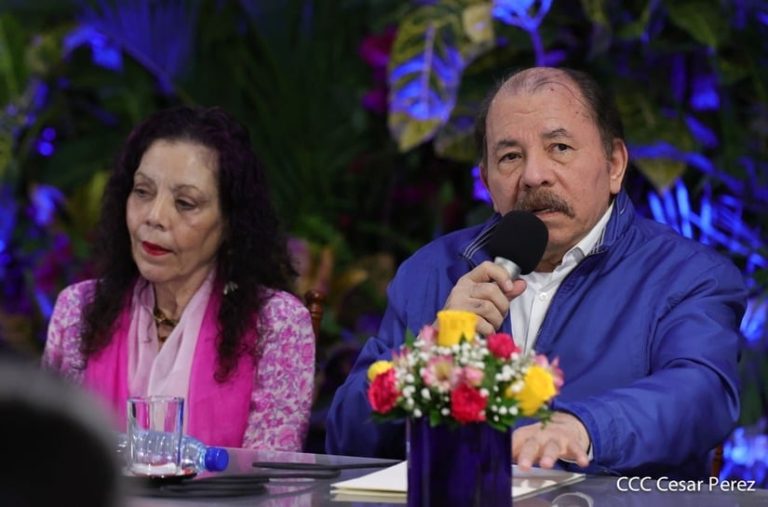12 de julio 2022

Ortega Grants Chinese Company a Huge Mining Concession

PUBLICIDAD 1M
PUBLICIDAD 4D
PUBLICIDAD 5D
In 2009, the dictator felt under threatened by “some nuns who were praying to assassinate him”

Dictator Daniel Ortega expelled 18 nuns of the Missionaries of Charity, the order founded by Mother Teresa of Calcutta, after closing down their charitable projects and cancelling the legal status of their association because they did not register as “foreign agents”.
This triple aggression against religious freedom, the right of association, and the right of the poor to receive social assistance from civil society organizations, has provoked widespread repudiation, even among supporters of the regime, and in international public opinion which also condemns the censorship and persecution unleashed against La Prensa newspaper as punishment for covering the news of the expulsion.
In fact, this is not the first time that the regime of Daniel Ortega and Rosario Murillo has launched a virulent attack against representatives of the Catholic Church. After the April rebellion, between 2018 and 2022, they assaulted the basilica of Diriamba; they attacked the church of the Divine Mercy with bullets, where they killed two university students; they attacked the image of the Blood of Christ in the cathedral of Managua; they provoked the forced exile of Bishop Silvio José Báez; they expelled the apostolic nuncio Waldemar Sommertag from the country; they besieged Monsignor Rolando Álvarez and dozens of priests in the churches; and they imprisoned Father Manuel Salvador García.
And in spite of these persecutory antecedents, the expulsion of the Sisters of Charity has caused astonishment, because they were only dedicated to help the most needy with works of Christian charity.
But, it is not the first time that the regime criminalizes people to people solidarity and attempts to prohibit aid to the most vulnerable in a country torn by poverty; to those affected by hunger and drought; to the victims of official negligence in the face of the covid-19 pandemic; and to the most unprotected by the lack of access to the most elementary social services. The prohibition of solidarity is in the dictatorial DNA of Daniel Ortega and Rosario Murillo, who intend to establish themselves as the only social benefactors before the poor, so that every time the population has access to a right, they give “thanks to the comandante and the compañera”, consecrating an act of political subjugation.
That is why they have already cancelled more than 950 NGOs, medical and educational associations, social programs of the Catholic Church, and above all, social and community development projects that underpin active citizenship, with the aim of installing a totalitarian regime in which the State-party-family embodied in the presidential couple is the only interlocutor with the population and especially with the poorest.
But even with all that evidence in plain sight, it is difficult to understand the viciousness against the nuns of Mother Teresa of Calcutta, and perhaps the only explanation, which is not a justification, is that this hatred has always been there, and is fed by the deep fear that Ortega and Murillo have of the people and the exercise of solidarity that is part of the identity of the democratic values of Nicaraguans.
Among the more than 1400 documents on Nicaragua leaked by WikiLeaks, which are based on diplomatic wires sent by the US ambassador in Managua to the State Department offices in Washington, there is one dated April 27, 2009, more than 13 years ago, by Ambassador Robert Callahan, in which he quotes a private meeting with the then first commissioner of the National Police Aminta Granera, in which the police chief tells of Ortega’s paranoia provoked by the alleged threat of some nuns. I quote: “Police chief Aminta Granera told Ambassador Callahan that President Daniel Ortega is completely crazy and represents a threat to the country”. And she added that, according to Ortega, there are “some little nuns who are praying for his assasination”.
In this diplomatic correspondence written by Callahan, Commissioner Granera does not specify who the nuns are, whom Daniel Ortega fears because they were supposedly conspiring against him, through prayer, to take his life.
According to Ortega, it is a “group of very elderly nuns”, who are praying to kill him, and he considers this to be a serious threat to national security.
Granera limits herself to say that she herself feels “unsafe” in regards to Ortega, because he considers her a potential political rival, and that the only thing that allowed her to keep herself safe from Ortega was her “growing popularity”. She concludes that the “only person who has influence over Ortega is his wife Rosario Murillo”.
Thirteen years after the publication of this premonitory WikiLeaks wire, the paranoia of Ortega and Murillo, their fear of the citizenry and of losing power, is the only thing that can explain the irrationality of a totalitarian regime that massacred its own people, imprisons and tortures those who demand freedom and free elections, closes all spaces of civil society, and feels threatened by the nuns of Mother Teresa of Calcutta.
This article was originally published in Spanish in Confidencial and translated by our staff
Archivado como:
PUBLICIDAD 3M
Periodista nicaragüense, exiliado en Costa Rica. Fundador y director de Confidencial y Esta Semana. Miembro del Consejo Rector de la Fundación Gabo. Ha sido Knight Fellow en la Universidad de Stanford (1997-1998) y profesor visitante en la Maestría de Periodismo de la Universidad de Berkeley, California (1998-1999). En mayo 2009, obtuvo el Premio a la Libertad de Expresión en Iberoamérica, de Casa América Cataluña (España). En octubre de 2010 recibió el Premio Maria Moors Cabot de la Escuela de Periodismo de la Universidad de Columbia en Nueva York. En 2021 obtuvo el Premio Ortega y Gasset por su trayectoria periodística.
PUBLICIDAD 3D